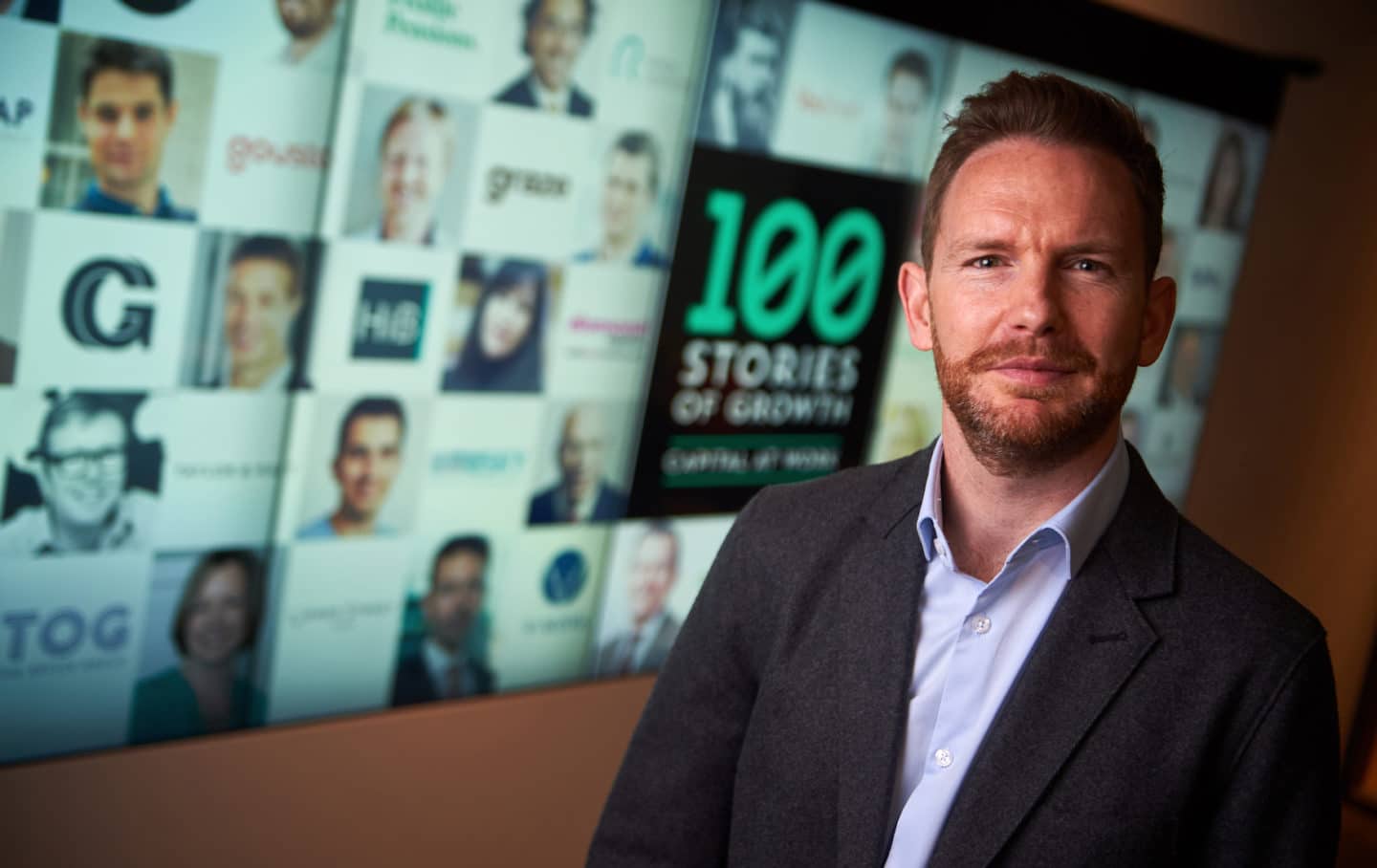A Guide to Mental Health for Entrepreneurs
Mental Health
Guy Tolhurst, leader of a new mental health initiative for businesses, on the mental and emotional toll entrepreneurship can have, and why we need a rethink on investor support.
Guy Tolhurst was an entrepreneur who was in denial about his mental health issues when he attended a peer networking event one of his friends was running. Fellow entrepreneur Michelle Morgan talked about the pressure of her business and from investors had led her to burn out physically and mentally: “And I was sat there at the back of the room with tears coming down my cheeks, desperately trying to hide it. I felt she was talking about my life. I thought, I have to do something about this.”
As he did this in his personal career, he also put his energies into ‘100 Stories of Growth’, a campaign which aims to support UK SME’s in finding proper emotional as well as capital support from investors, and to build companies which work with the same ideals.
Guy has now co-authored a fantastic book called ‘100 Stories of Growth: How they did it’, which tells the stories of the highs and lows of business and personal growth in order to show entrepreneurs what they might experience and that they are not alone!
Here Guy gives us an introduction to the main issues he works around as well as a guide to better self-care for entrepreneurs.
The pressures on Entrepreneurs
We carried out a study last year and found close to half of the founders we spoke to felt they were under constant extreme pressure in growing their business. 25% of them said the pressure of growing their business had affected their mental health, but that they suffered in silence.
This has become a growing problem over time. One of the reasons for that is because the level of intensity and competition and environment and expectations of our businesses to exceed has really intensified. A lot of money goes into these businesses with a huge level of expectation. A huge amount of pressure is being placed on the shoulders of these small business owners, a pressure they probably weren’t anticipating. They went out into the market, found a good idea, raised the capital, and thought, “Fantastic, I’ve got my money,” like on Dragon’s Den, but what they haven’t realised is that’s the start of their problems. With investment, of managing someone else’s money, comes a responsibility, a pressure that goes with that.

Not-So-Supportive Support Networks
One of the things we discovered in our research was more than a quarter of entrepreneurs wanted more support. In terms of the mental health challenges for entrepreneurs, it can be a very lonely experience. When we were interviewing the entrepreneurs, they talked about the challenges they faced in growing their business but also in finding people they could talk to.
When you start a business, it’s like having concentric circles. At the middle you have the entrepreneurs, and when he grows his business he looks around him to their circle of family and friends, and they bring them along for the ride, and look to them for support and confidence that they’re making the right choice in quitting their job or sacrificing time with family to start this journey.
Then the next support network is their team – their business partners, staff – who become second ring of support. And then the third outer ring of their support network might be investors, with a fourth of their peers.
Now when things start to go wrong for an entrepreneur in the middle, they can’t go back to their family and friends, who they brought along for the ride, and convinced them it was the right thing to do. They can’t now tell them, “I’m really struggling with this, I’m not so sure I should have done it.” They can’t speak to their nearest and dearest.
Also, they can’t go and speak to their team because they don’t want to be seen that there’s a lack of confidence in the leader. And then they can’t speak to their investors because investors might say there’s a problem here, we have to replace this Founder/CEO and get a new, seasoned one in. And if they haven’t got a strong peer network, all of a sudden they’re sat there having built up these concentric circles of support network but really have nobody to speak to.
It’s one of the unique challenges facing entrepreneurs. You build up a support network over time but when things go wrong you can’t really rely on that support network. You need people who are going to nurture and support you through these times.
And that was the idea of the book, because entrepreneurship has become very fashionable. God knows what headwinds we have coming up with the economy and Brexit but its great that we’ve got a thriving private sector with lots of people running small businesses. Everyone is an entrepreneur with side hustles. But with it being so cool and fashionable, everyone thinks they can have a go, and the idea behind the book was to show that when you grow a business there’s going to be lots of challenges.
And those challenges in my opinion are in 4 key areas:
- Financial capital
- Human capital
- Emotional capital
- Intellectual capital.
You can never really chart what an entrepreneur’s experience is going to look like. There’s lots of deflection points but I think they can be grouped into those four areas of capital. Thorough the book I wanted to uncover the stories of people who have grown businesses and the highs and lows along the way.
I believe there’s a critical need for the investor community to take real responsibility with the money that’s being put into these businesses. And not treat businesses like slot machines, thinking they can keep putting money in the top and one day it’ll be ching, ching, ching out of the bottom. Because ultimately a business is its people. At the core of the business is a group of people united behind a mission, or an idea.
The investor community need to put people and profit on an equal footing. Healthy minds means healthy profits. And that’s the key thing here. If you look after your team and look after your people, the money will eventually come. And that’s’ really why I came up with the Mindful Investor initiative, which would be like a Kitemark for the investor community, and really represent the entrepreneurial community in saying: we need more than just your money.
The investor/entrepreneur relationship reframed.
Flip it around. What should a founder be asking from their investor?
Of course you want to understand how successful they’ve been and what other businesses they’ve done, but what about cultural things? “How much are you going to invest in me and my leadership team, and our positive well being?” You should be asking questions like, ‘How many businesses you invested in have still got the founder/CEO in place? And how has that changed since you put your investment in?’ If you see that 100% had the founder in when they invested but only 50% have got them in now, it’s clear they’re burning out the founders/CEOs and replacing them because you’re focused on the money.
The analogy I like to use around this is if you think about our elite sports teams today, the games that they play- football, hockey, netball, cricket – they haven’t changed much in a few hundred years. They look pretty much the same as when they were first invented. But the big thing that’s changed is the level of intensity and competition, the expectation placed on these teams to compete on a global and national stage, and sponsorship money, and then the margins for error. We’ve all seen with these competitions how closely fought these battles are between our elite sports teams. So how do we make sure our sports teams can compete on a national and global stage? We look after their physical and their mental health. We prioritise both of these. We surround them with nutritionists, trainers and psychotherapists, to look after their mental and physical fitness.
Now what do we want of our entrepreneurs? If you’ve invested in a business you’re asking that business to compete on a national and global stage. You’re asking them to build a team and put it into a very competitive environment with high expectations, small margins for error…so it’s exactly the same. But what do we give our entrepreneurs and businesses? Money. We don’t give them any layers of support around physical and mental health. Point to me one investor out there who has a personal trainer on their books or a therapist on their books? Why not? They’re spending millions of pounds on investment managers to go and find the next best thing, but then they’re not spending even a percentage of that money on these things for the businesses they’ve just put money into.
We need to create a much more supportive and nurturing investment community. Some investors are better than others – this isn’t a crusade against investors, they play a vital role in supporting the growth of a business, and the management team. But some investors do the complete opposite, which has resulted in the entrepreneur burning out.
Not all capital is created equal and entrepreneur need to understand that it’s about the right investments at the right time for the right partner.
The problem with too much early investment
In 2012 we had an access to finance problem in the UK. It was really hard for people to get their ideas for businesses financed. So what did people do? They had to spend more time out there building their businesses, selling their products, bootstrapping their idea. They spent a lot of time in that market validation phase: ‘Are people going to come and work for me, are people going to come and buy my product?’ But during that time they’re building up lots of resilience. Win contract, lose contracts. Recruit somebody, lose somebody. They’re building up entrepreneurial resilience.
Fast forward to 2018. And what we had last year was more capital flowing into small businesses than ever before. The government intervened after 2012, with the British Business Bank, the Business Growth Fund, the Northern Powerhouse, all of this stuff, with lots of crowdfunding interventions, and they flooded the market with capital. But by doing that what we now have is instead of someone building their business for five years before they think about getting any capital, or even being able to raise some money, people can now raise a million quid on a crowd funding site within six months of starting a business with just a glossy deck, a video, and an influencer on the front of it. You only have to look at the Fyre Festival documentary – people were flooding loads of money into this ridiculous festival, because he was flying people out to the Caribbean and showing people half naked on jet skis. Everyone piled in with money.
Effectively we shortened to runway to investment quite significantly. And by doing that entrepreneurs haven’t had enough time to build up their resilience. They haven’t spent enough time in the market validation phase, they haven’t had the bumpy ride. So when they then take on investment and the investor then goes, “Right here’s all this money, we want you to be in 5 countries by the end of the year, we want you to increase your headcount from 2 to 60, we want you to develop 4 more products…Crack on, we’ll see you in 6 months!”
The pressure that that creates is immense. And guess what? They could only get into 2 countries, they couldn’t attract talent, they can’t do it. And then the investor says, “Well you put this fantastic deck in front of us saying you’d do all this, why have you not done it?” And that’s where the anxiety starts to come through, the panic attacks, the lack of self worth, “I don’t know what I’m doing.” The entrepreneurs end up burning out but it’s not their fault, they’ve been capitalised at a time when they weren’t ready.
My message to the entrepreneurial community is think about if going into business is right for you because it certainly isn’t for everybody. Think about the right time to take on capital and if it is, what sort of capital, because some debt arrangements don’t come with anywhere near the level of pressure or expectations that equity investment does. There’s lots of ways to finance a business.
And for the investment community it’s: put mental health on your agenda. Show the entrepreneurs that you are supportive of them and their leadership team. And that you’re going to guide them through.
Emotional capital
You get financial capital but what people don’t realise is you need someone to then be talking to you about emotional capital. If you’ve taken on money the first thing you need to think about is, how am I geared up to deal with this? What if in two years time I don’t hit the numbers? What’s going to happen?
And you need somebody, at the point of taking investment, who is doing a complete road map pulling these support networks around you to protect your emotional capital. At that point you are so high on life and basking in your own success, you haven’t even thought of what’s coming.
The best way of dealing with it is to highlight it with the entrepreneurial community, the realities of capital, but also by giving the investment community a framework to work towards.
We are going to be doing things like encouraging the investment community to have mental health first aid training. And to have unconscious bias training, to try and redress the balance in terms of business that are receiving funding – there are massive gender inequalities there. They’ll have mental health charters within their organisations, and put mental health on the agendas of the businesses they’ll be investing in. The agendas we suggest include having separate meetings for the issues. One meeting when they go and see the founders about the financials and the growth, and another four weeks later about the founder about them. “How we can help you?”

Mental health techniques for entrepreneurs
The first one links back to the support network. The support network is so important, I can’t stress how important it is. It’s about building a multi-tier multi-level support network. Most entrepreneurs I speak to are part of formal and informal networks of other entrepreneurs. A peer network is important because there’s nobody else who will have sat in the office on the last Thursday of the month, 11 o clock at night, wondering how you’re going to meet the payroll because the three companies who owe you money haven’t paid you. The only other person who knows how you’re feeling then is another entrepreneur. Your partner is going to want you to come home, you can’t tell your investors and your team have all gone home. So in those moments it’s about possibility thinking.
New parents have to go to NCT classes and in one session they ask you about all the people who you could think of who are in your support network, a possibility thinking session. You have to think about it for quite a while, but you come up with a lot of mates who you probably hadn’t initially thought of. And I think it’s the same for entrepreneurs.
If you’ve had investment and you’re starting to feel like you’re struggling, sit down for a minute. You do’t have to talk to anyone yet, just sit down and think, ‘if I was going to talk to somebody, who would make the list?’
And then just having that list there, you know you’ve got it as an aid if you need to.
I also think that another one is small adjustments. You can look too far ahead in business, but if you think about where you want to get to emotionally, you can make small adjustments in order to get there. One of the things I’ve done in the past is I’ve written down ‘Good feels like…’ and then you fill in the blanks. ‘Good feels like having a conversation with a member of my team about their conduct.’ ‘Good feels like building time in my week to go to the gym.’ ‘Good feels like going to be home twice a week to read my children bedtime stories.’
Just making a list until you feel comfortable, and then going down that list and make small adjustments…you’ll be amazed.
Finally know that you’re not alone. There are lots of stories, lots of experiences in our book. Whatever your unique situation is, there’s a lot of empathy out there from people who might have had similar experiences. Feeling vulnerable can feel a bit painful initially but you can often find solace.
Things are changing for the better
The big thing is if we can get everybody to treat mental health like they do physical health, we have won a huge battle.
We all have periods of good mental health and periods of poor mental health, but there’s a big battle to overcome the stigma.
I definitely think things are changing for the better though, people are doing really important work with the communities that need it the most. And I think the fact we’ve had high profile figureheads coming forward, like the Duke of Cambridge, Michele Obama talking about her therapy… it’s no different seeing a therapist twice a month to seeing a personal trainer twice a month, but everybody’s perception is that it’s different. So it’s really good that people are coming out and talking about it.
Generally I’m very hopeful and it’s great that large organisations and different communities are talking about it so openly.
Buy Guy’s book ‘100 Stories of Growth: How they did it’ here.

Join The Book of Man
Sign up to our daily newsletters to join the frontline of the revolution in masculinity.


















